19 July 2024: The abstract of my Bachelor in Medical Sciences final year research project entitled “Characterisation of Pteropine Orthoreovirus Oncolytic Activity on Leukaemia Cells and Cancer Stem Cells” was accepted by the technical programme committee of Malaysia-Japan Visionaries Conference (MJVC) 2024.
MJVC 2024 is a multi-disciplinary conference held at the University of Tokyo, Japan, that gathers scholars from technology, social sciences, engineering, law, business and medicine grounds to exchange their insights.
I was honoured to have the prestigious opportunity to present orally at the conference, especially since my qualification remained at the Bachelor’s level and I would be engaging in scientific discussions with esteemed professors and experts in each field.
Remarkably, I noticed that my peer from ME221, Josephine Ong Chin Wey also participated in this conference as a poster presenter for her Health Delivery Science module project regarding the prevalence, perception and experience of online resources to self-diagnosis among adults in Klang Valley. Additionally, my senior, Dr Muhammad Aniq bin Halim, also presented his intriguing project on reviewing the effects of cocoa pod husk compost on soil fertility, rice yield and starch content in rice grains among small-scale farmers in Malaysia.
The thrill and enthusiasm I felt deep in my heart motivated me to exert maximum effort in preparing high-quality presentation slides for my topic. I had repetitively consulted my postgraduate senior, Mr Siew Zhen Yun from the University of Nottingham Malaysia, who I collaborated to complete my final year project, to ensure the data analysis and literature information were accurate and appropriate.
Additionally, I presented my study to my family members and relatives to assess their understanding of the technical terms I described to reduce the use of medical jargon and avoid confusion among non-experts.
14 September 2024 (Day 1 of MJVC 2024)
I gazed upon the modern and gothic buildings of the University of Tokyo, some showcasing elements of classic and traditional Japanese architecture from the Edo period. The tranquil atmosphere of the campus, with the large, tall ginkgo trees coupled with the gentle summer breeze was soothing and stress-relieving.
As I arrived at the Sanjō conference hall, I noticed that the primary stream of the MJVC was on engineering and technology, as the keynote speaker (Professor Tanaka Kenji from the Graduate School of Engineering, University of Tokyo) shared advanced, innovative engineering projects to solve environmental and social problems. A few questions that crossed my mind were whether conference topics were relevant to me and whom I should connect with if the attendees were not experts in medical and health sciences.
15 September 2024 (Day 2 of MJVC 2024)
On the day of my oral presentation, I set off to the campus filled with confidence and excitement. I was not nervous because I perceived the oral presentation as an interactive exchange between the judges and the audience. The primary objective of my presentation was to clearly articulate the purpose of the study and the conclusion of the results without utilising complex terminologies.
As I introduced myself to the other presenters in the health and medical track, I realised I had not prepared a personal name card for exchanging contact information, reflecting my lack of cultural awareness. Nonetheless, I had connected with nutritionists, pharmaceutical chemists, medical officers and medical biotechnologists.
Moreover, I observed that the studies presented by others focused on the clinical and industrial aspects, whereas my research was laboratory-based, concentrating on virology and oncology. Thus, there was a greater chance that the audience might struggle to comprehend the technical terms related to transcriptomic analysis, cell death arrays, and viral kinetic studies.
As I started presenting, I instinctively maintained eye contact with the audience and only referred to the slides when I needed to highlight specific illustrations and explain the details of the images.
Notably, I noticed that the audience’s facial expressions gradually shifted to confusion as I was explaining the results section. For this reason, I immediately adjusted my presentation by simplifying all the technical terms and using more body language to describe the results. For instance, I replaced “viral-induced cytopathic effects” with “virus infects cells and cells die” and referred to “THP-1 cells” as AML cells instead.
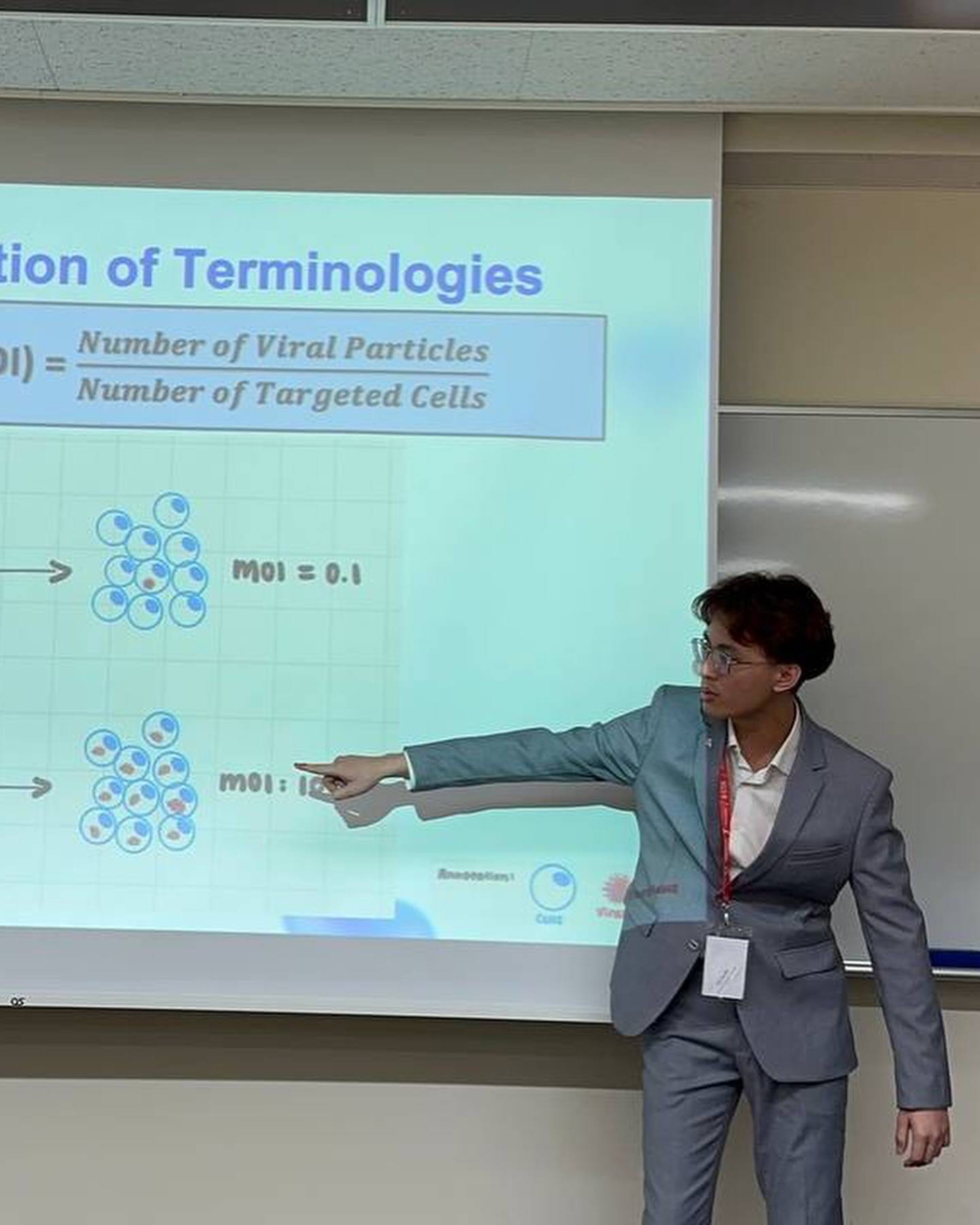
The key lesson that I learned from this experience was to avoid presenting my study strictly according to prepared scripts and prevent speaking too rapidly due to time constraints.

Instead, focusing on effective communication with the audience was far more crucial as they were not obliged to be familiar with all the details of my study’s methodology and results.
Consequently, I received encouraging words from my judge, Dr Farha Naomi, as well as from the other presenters, motivating me to continue pursuing my dream of becoming an oncology specialist and researcher in alternative treatments.
The keynote speaker on the second day of MJVC, Prof Ts Dr Ali bin Selamat from Universiti Teknologi Malaysia (UTM) who inspired me with his speech on the introduction of artificial intelligence (AI) technology and the application of AI in business and industry.
The definition of AI is a technology that renders machines and computers to learn like humans, solve problems, and make decisions. In simple words, “AI has to learn from humans”, Prof. Ali said.
Questions were raised from the audience regarding the incorporation of AI in medical practice and the concern of AI replacing healthcare providers in the future. The response to that inquiry indicated that, at the current stage of technological advancement, AI technology is not entirely reliable for diagnosis, prognosis and treatment. It makes errors similar to those of humans, which underscores the necessity of human intervention in the integration of AI into medicine. Therefore, medical professionals should not be fully substituted by AI because emotional empathy and rational decision-making remain essential for patient care.
From this statement, I learned that technology is highly relevant to individuals in healthcare, as modern medical practices are increasingly utilising digital tools to streamline complex procedures such as documenting patient records, conducting population-based screenings, and promoting disease prevention in the general public.
16 September 2024 (Day 3 of MJVC 2024)
Before the award ceremony, I approached our presentation judge, Dr Farha Naomi and Dr Ahmad Akira, to express my interest in learning methods of reprogramming pluripotent stem cells and induced stem cell (iPSC) culture in Japan.
I also shared that my career plans extend beyond specialisation as an oncologist, I intend to pursue a doctoral degree to study cancer stem cells in Japan, as the country has leading research institutions for cancer and stem cell studies. I felt fortunate to receive guidance on various options and scholarships to apply for postgraduate studies in Japan. However, the application will not be easy, considering my lack of experience in laboratory research and the language barrier.
Dr Akira encouraged me with his kind words: “It is normal to have doubts and questions, the most important quality as a student or researcher is to ask questions.” Questions will stimulate lifelong learning and place efforts to find innovative solutions to solve the problem. Hence, I carved these words in my mind and always remind myself that curiosity drives learning and innovation.
To my surprise, I felt a sense of relief and satisfaction when the MJVC committee announced me as the winner of the best oral presentation award for the Health and Medicine track. This achievement made my first conference experience truly rewarding and enriching, and I managed to network with several experts in the healthcare and technology fields.
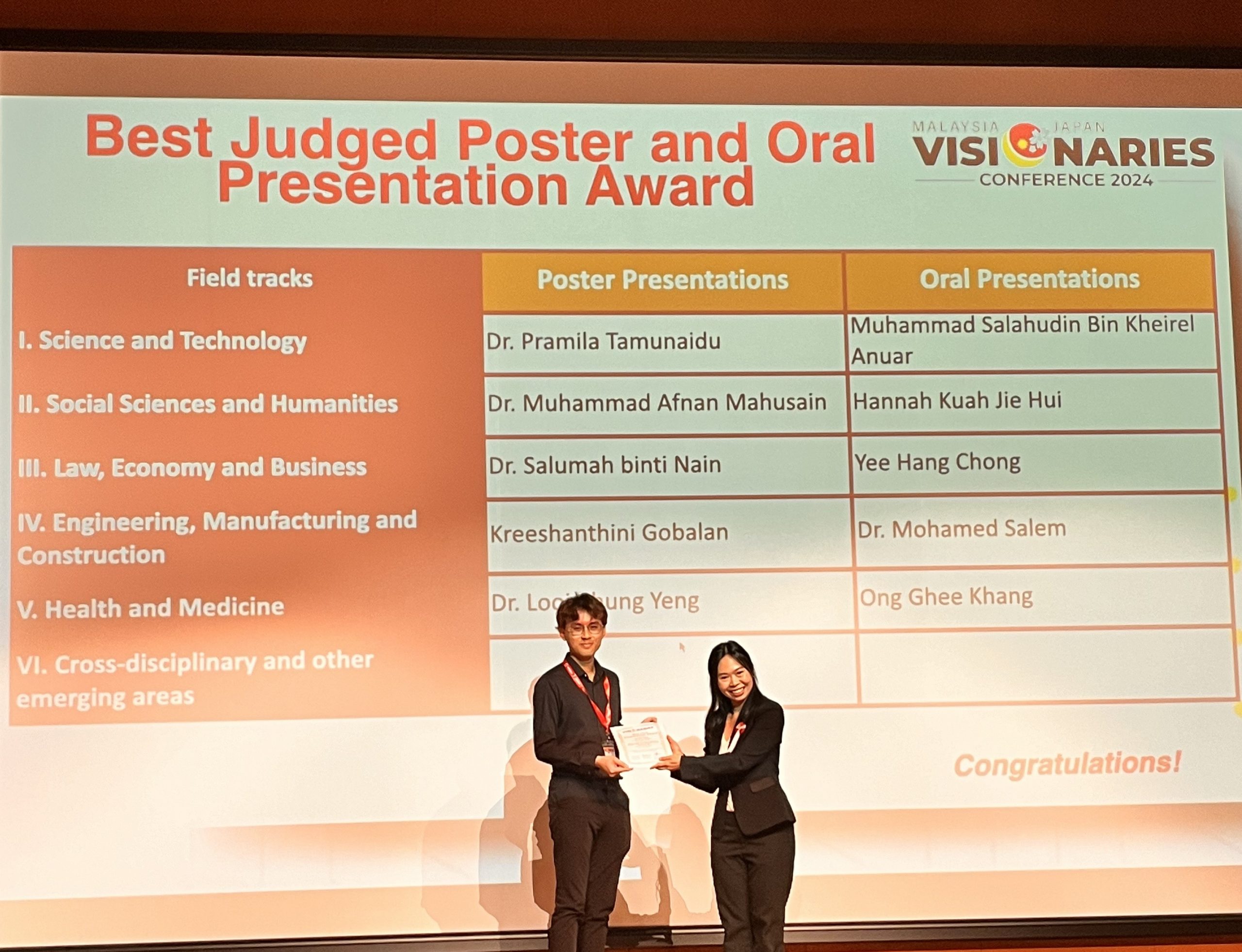
I extend my deepest gratitude to my main research supervisor, Dr Wong Siew Tung for being a patient and supportive mentor who assisted me in data interpretation of the project, provided presentation tips during mock presentations, introduced me to basic laboratory skills at IMU research laboratory prior to conducting my final year research project and always present to offer encouragement and mental support whenever I needed it. I owe a dept of gratitude to my postgraduate senior, Mr Siew Zhen Yun, for being not only a good peer tutor in laboratory skills, but also as a close friend to me. He encourages me to constantly push through limits and aim for the highest standards to produce good quality research papers.
Mr Siew motivated me to remain actively engaged in writing scientific papers even after graduating with my BMedSci degree. He inspired me to pursue a path as a medical student and researcher, striving to excel in clinical, laboratory and research skills.
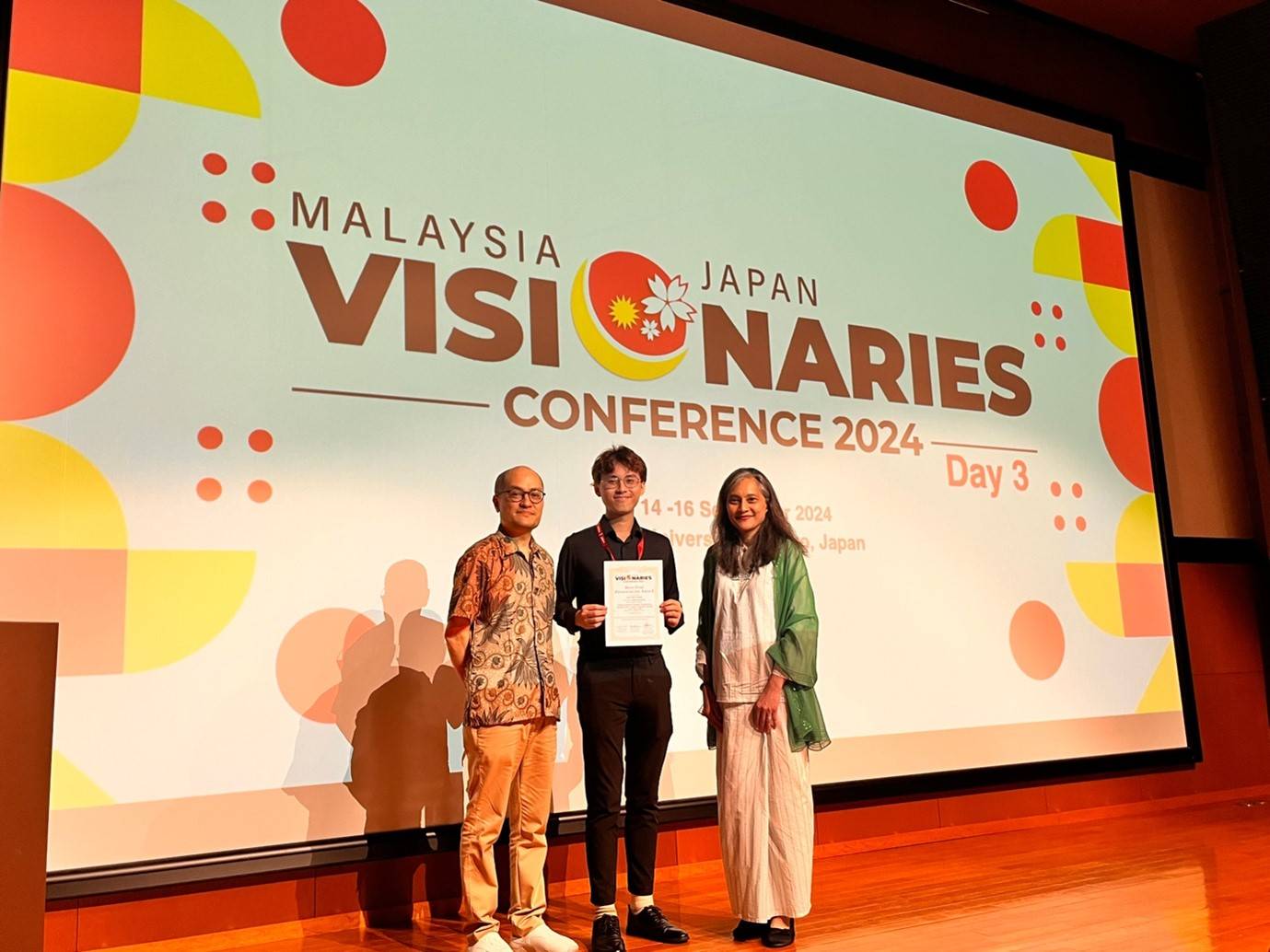
Additionally, I thank my co-supervisors, Dr Kenny Voon and Dr Leong Pooi Pooi, for training me in cell culture and various molecular techniques and provided resources and bench spaces in the research lab of the University of Nottingham Malaysia and Universiti Tunku Abdul Rahman.
I sincerely thank the Students Services Hub from IMU University Bukit Jalil and clinical campus for providing partial financial support for my application to this international conference.
This achievement would not have been possible without the unwavering support of my research supervisors, postgraduate senior, family and course mates. This award inspires me to keep pushing forward in pursuit of my ideal career to make meaningful contributions to oncological research in the future.
In conclusion, participation in MJVC 2024 has taught me five vital lessons:
– To be an adaptive presenter or communicator
– To have curious and innovative thinking
– To appropriately utilise AI in learning
– To foster networks with experts in different backgrounds, and
– To be culturally sensitive.
All of these qualities align with the learning philosophy of IMU University, which I will recognise and apply in my clinical training and future medical practices.
Written by Ong Ghee Khang

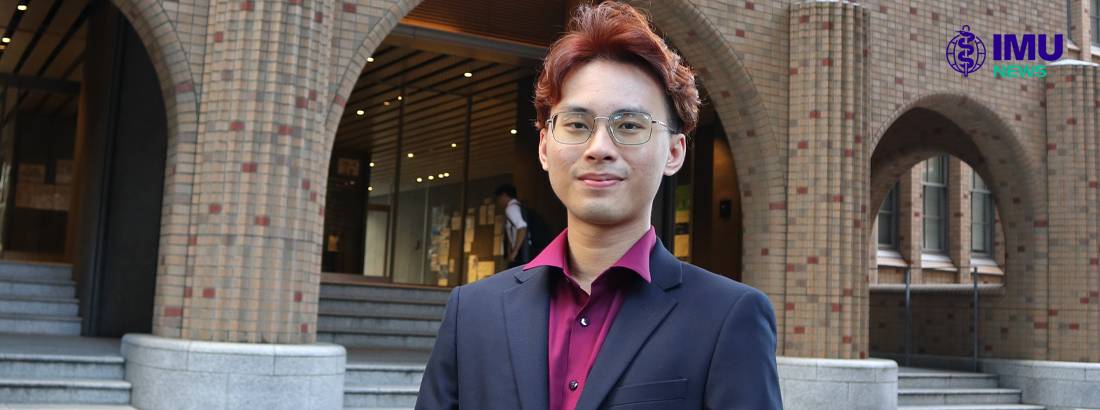
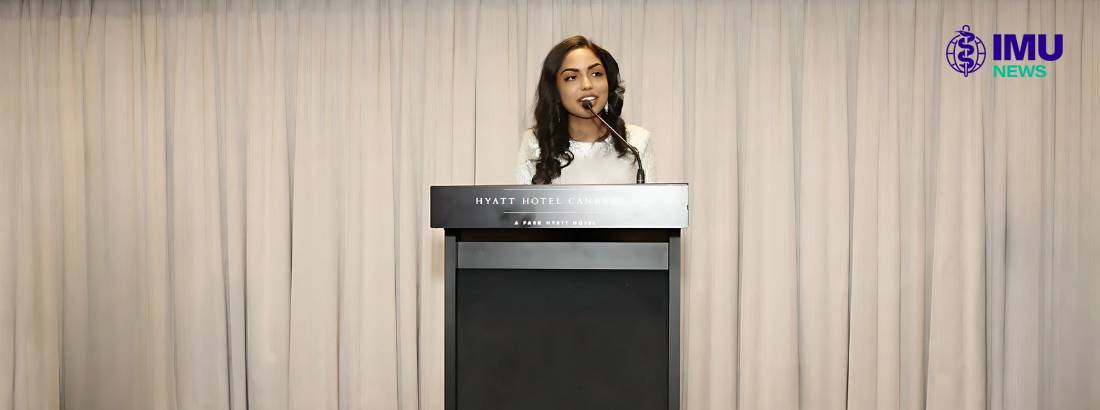
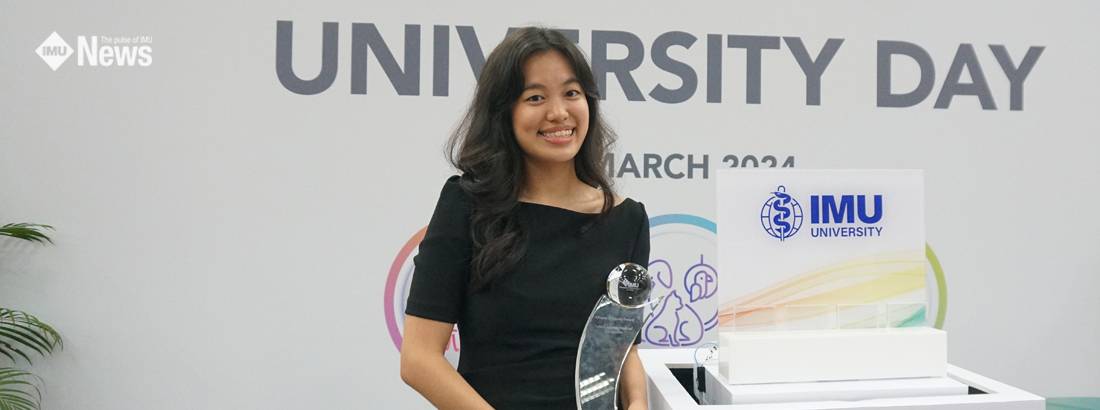
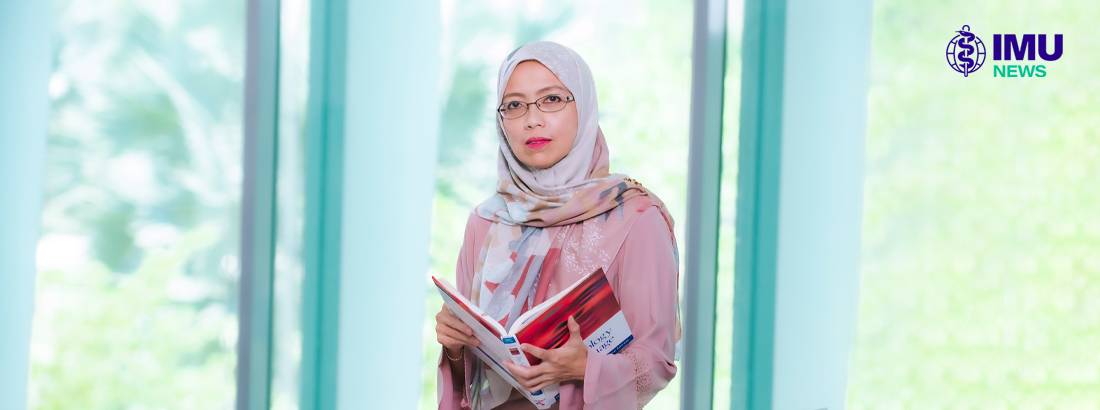
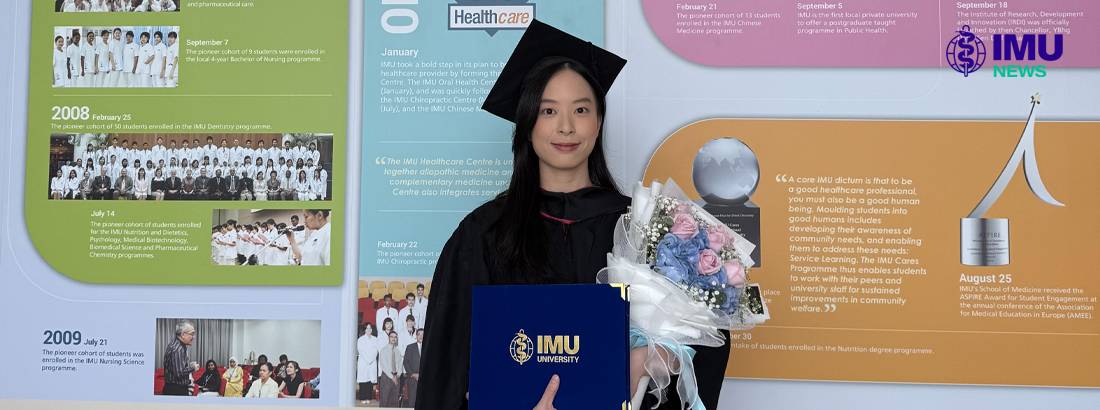
No approved comments.